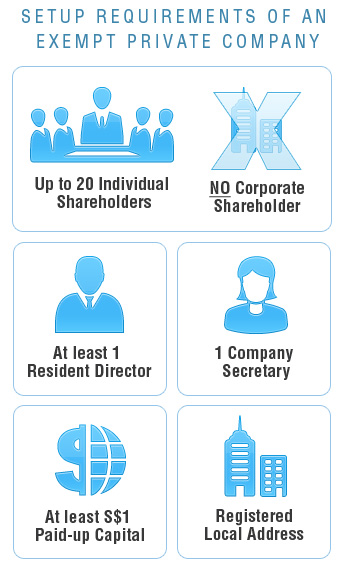 All companies in Singapore must be registered with the Accounting & Corporate Regulatory Authority (ACRA) and abide by the Companies Act, Chapter 50. While there are five different entities to choose from, namely sole proprietorship, partnership, company, limited liability partnership and limited partnership; the most common and flexible option is to set up a Singapore company.
All companies in Singapore must be registered with the Accounting & Corporate Regulatory Authority (ACRA) and abide by the Companies Act, Chapter 50. While there are five different entities to choose from, namely sole proprietorship, partnership, company, limited liability partnership and limited partnership; the most common and flexible option is to set up a Singapore company.
The obvious benefit is that a company in Singapore is limited by shares and is a separate legal entity from its shareholders. It is recognised as a taxable entity in its own right. As a result, shareholders of a Singapore company are not liable for its debts and losses beyond their amount of share capital.
Thus, those willing to kick-start their careers as entrepreneurs must register a Singapore company first; the key requirements for which includes:

- at least one shareholder
- one resident director (may be a citizen, permanent resident, EP holder or Dependent Pass holder)
- as the company requires one shareholder and one resident director, it can be the same person. But it’s always advisable to opt for at least two directors as banks and other financial institutions usually require two signatories.
- one company secretary
- initial paid-up share capital of at least S$1
- a physical Singapore office address
If all the above conditions are met, an important decision is the number of initial shareholders and the shareholding pattern of the company.
If the company has more than 20 but less than 50 shareholders, it’s called a private company. If the number of shareholders exceeds 50, it becomes a public company.
Finally, if the number of shareholders is 20 or less, with no corporation holding any beneficial interest in the company’s shares, it is known as an Exempt Private Company (EPC).
The incorporating procedure for all the three types of companies – private, public and EPC, is the same.
Benefits of an EPC
EPC is currently the most common and preferred type of business entity in Singapore because of the reduced compliance requirements, more freedom in financial loan activities, and tax-exemptions granted in the start-up stage.
Less Compliance Requirements
 Importantly, the current legislation exempts EPCs, with an annual turnover of less than S$10 million and are solvent, from annual audit and accounts submission requirements. Instead, they just have to submit a solvency declaration signed by the company director(s) and company secretary in the prescribed form.
Importantly, the current legislation exempts EPCs, with an annual turnover of less than S$10 million and are solvent, from annual audit and accounts submission requirements. Instead, they just have to submit a solvency declaration signed by the company director(s) and company secretary in the prescribed form.
Another option that an EPC has is to submit its unaudited accounts to the registrar and ACRA.
Importantly, EPCs are still required to maintain proper accounting records, prepare and present financial statements in compliance with the Companies Act and the Singapore Financial Reporting Standards (FRS). However, they are not required to file financial statements.
 Moreover, in accordance with provisions in the law, the Registrar of Companies and shareholders with at least 5 percent stake in the EPC can also ask the exempt private company to prepare and submit audited accounts to the authorities.
Moreover, in accordance with provisions in the law, the Registrar of Companies and shareholders with at least 5 percent stake in the EPC can also ask the exempt private company to prepare and submit audited accounts to the authorities.
Meanwhile, it is mandatory for EPCs with annual turnover exceeding S$10 million to get their accounts audited and filed just like any other company.
The following table gives an overview of the filing requirements of the various types of EPCs in Singapore:
| Types of EPC | Definition | Filing requirements | |
|---|---|---|---|
| Solvent (able to meet its debts) | Insolvent (not able to meet its debts)
|
||
| Small EPC | annual turnover < S$10 million |
|
|
| Dormant EPC | no business activities in the current financial year or have not commenced business since incorporation | ||
| Normal EPC | annual turnover > S$10 million |
|
|
More Financial Loan Activities Freedom
 Also, as regards to financial loan activities, EPCs enjoy a greater degree of independence as compared to other types of companies. They have more flexibility in the ways of dealing with capital as deemed fit in the ever-changing business realities.
Also, as regards to financial loan activities, EPCs enjoy a greater degree of independence as compared to other types of companies. They have more flexibility in the ways of dealing with capital as deemed fit in the ever-changing business realities.
According to the Companies Act, companies are prohibited from giving loans to another (related) company or to provide guarantees and/or security for loans obtained by another company if the director of the first company has a 20 percent or more interest or shareholdings in the second company.
The Act also does not allow a company to extend loans to its directors except for certain purposes.
EPCs are exempted from the above requirements.
Higher tax exemptions
 Apart from saving on the costly compliance fees, a newly-set up EPC is given tax exemptions under the Start-up Tax Exemption (SUTE) scheme.
Apart from saving on the costly compliance fees, a newly-set up EPC is given tax exemptions under the Start-up Tax Exemption (SUTE) scheme.
As per this scheme, tax exemption is given to start-ups on normal chargeable income of up to S$200,000 for each of the first three consecutive years of its operation.
- for first S$100,000, after 75% exemption, the exempt amount is S$75,000
- for the next S$100,000, after 50% exemption, the exempt amount is S$50,000
- thus, the total exempt amount for income up to S$300,000 is S$125,000
Note: Not applicable to property and investment holding companies.
| Chargeable Income | Exemption | Exempt income |
| First S$100,000 | 75% | S$75,000 |
| Next S$100,000 | 50% | S$50,000 |
| So up to S$200,000 | S$125,000 |
Related Reading » Singapore Company Setup
Incorporate a Singapore Exempt Private Company quickly and easily
Singapore Company Incorporation is the leading force in company registration in Singapore. With a gamut of services including Work Visas & Relocation, Accounting & Taxation, Business Licenses, Company Secretary and Trademark Registration, we are well-positioned to support your business.
